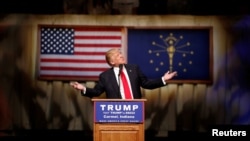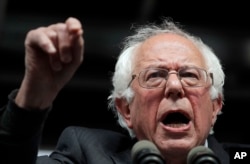Texas Senator Ted Cruz has dropped out of the Republican presidential contest after a big loss Tuesday in the Indiana primary to billionaire real estate magnate Donald Trump.
Cruz told supporters in Indianapolis that his "path toward victory has been foreclosed," saying voters have chosen another path.
He thanked all his supporters, calling them "incredible patriots."
WATCH: Cruz Announces Suspension of His White House Bid
Trump won Indiana in a landslide, with Cruz second and Ohio Governor John Kasich far behind in third.
Trump called his win in Indiana a "tremendous victory" and congratulated Cruz, calling him and the 15 others who ran for the Republican nomination smart and tough competitors. He is appealing for unity in the Republican party.
Watch video report from VOA's Jim Malone:
The head of the Republican National Committee, Reince Priebus, is calling Trump the "presumptive" nominee,
But a Kasich spokesman said the governor is still aiming for a deadlocked contested convention in July, where he looks to capture the Republican nomination on a second or third ballot.
A victory in Indiana would give Trump 57 more delegates, bringing him closer to the 1,237 needed to clinch the nomination.
For the Democrats, the Vermont Senator Bernie Sanders is projected to be the winner in Indiana over former Secretary of State Hillary Clinton.
The two candidates exchanged the lead all night before Sanders pulled away to win by a projected seven percent of the vote.
Even with a Sanders win in Indiana, Clinton leads the delegate count by a huge margin, making it just about mathematically impossible for Sanders to become the Democratic nominee.
Trump, the often harsh-speaking former television host who has never been elected to any political office, is now shifting his insulting rhetoric from Cruz to Clinton.
Earlier Tuesday, he disparaged Clinton's performance as secretary of state from 2009 to 2013, saying she was asleep during part of a 2012 terrorist attack on a U.S. compound in Benghazi, Libya that killed four Americans.
Trump told supporters he could defeat Clinton in states Republicans do not normally win, even as early election surveys suggest otherwise.










